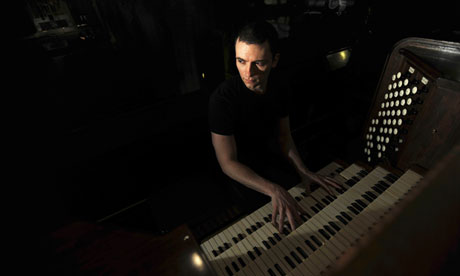
Home Office ministers have refused to apologise to a Grammy award nominated American classical musician who was wrongly barred from entering Britain last month and detained overnight for seven hours at Birmingham airport before being put on a plane back to Berlin.
The Home Office opened an investigation into the incident after complaints in the House of Lords that the "heavy-handed treatment" of Cameron Carpenter, a virtuoso young organist with a global reputation, amounted to an "absolute scandal".
The case was raised by Lord Clancarty, who said Carpenter had been held for seven hours by the security firm Tascor in a brightly lit room where he was interviewed and fingerprinted during the night. "At 7.05 in the morning he was escorted by armed guard on to the first plane back to Berlin."
Clancarty said the organist had been barred from entering Britain two days before his Birmingham concert because the UK Border Force officials at Birmingham airport knew nothing about the permitted paid engagement scheme for artists and musicians under which he could enter the country.
Carpenter had a shower after landing in Berlin and caught the next plane to Heathrow where he was allowed into Britain as he should have been in the first place. He arrived just in time to deliver an under-rehearsed performance in Birmingham.
Clancarty told ministers that Carpenter's experience was more than the heavy-handed treatment that was meted out to other artists trying to visit Britain but amounted to abuse because he was subjected to all-night sleep deprivation.
He also pointed out that the permitted paid engagement scheme had been introduced two years ago to deal with repeated complaints that the immigration system was barring musicians and artists from making British appearances.
Cameron, who has been described as "the bad boy of the organ world" posted a picture of himself putting up two fingers to his deportation notice on his Facebook page, saying: "I got your majesty's service right here, pal."
He described Tascor, which runs the short-term immigration holding centre at Birmingham airport, as "the creepy, vague, Orwellian detention subcontractor [HM Border Force] use to keep people awake in brightly lit rooms filled with tearstained children's toys and assorted religious texts."
Carpenter said that immigration officials in Birmingham were totally unaware of the laws governing permitted paid engagement, which he described as the three words artists entering Britain really need to know.
The Home Office minister Lord Taylor has written to Clancarty telling him the investigation into allegations of all-night sleep deprivation and other heavy-handedness had established that no mistreatment occurred.
"Mr Carpenter's case was concluded by 0130 hours and he was offered refreshments on a number of occasions, which he accepted. No complaints or issues were raised by Mr Carpenter during the time that he was detained and no formal complaint has been received," said Taylor.
He said Carpenter had been barred because he lacked a sponsor's certificate but he conceded: "Although the guidelines and policies were correctly followed by officers, Border Force accepts that more could have been done to assist Mr Carpenter."
The official response to the Carpenter case emerged as prison inspectors disclosed that people are routinely being detained for longer than the maximum 24 hours at two other short-term immigration holding centres, at Stansted and Luton airports. Both are also run by Tascor.
Nick Hardwick, the chief inspector of prisons, said that in the three months before his recent inspection at Stansted, 462 detainees had been held for an average of eight hours and 55 minutes. He found that in one case a detainee had been held for more than 40 hours.
At Luton, prison inspectors found five cases of detainees held for longer than 24 hours including one person who had been detained for 35 hours and 40 minutes.
At both airports, inspectors criticised the practice of taking detainees in handcuffs to the detention room in full view of the public.

